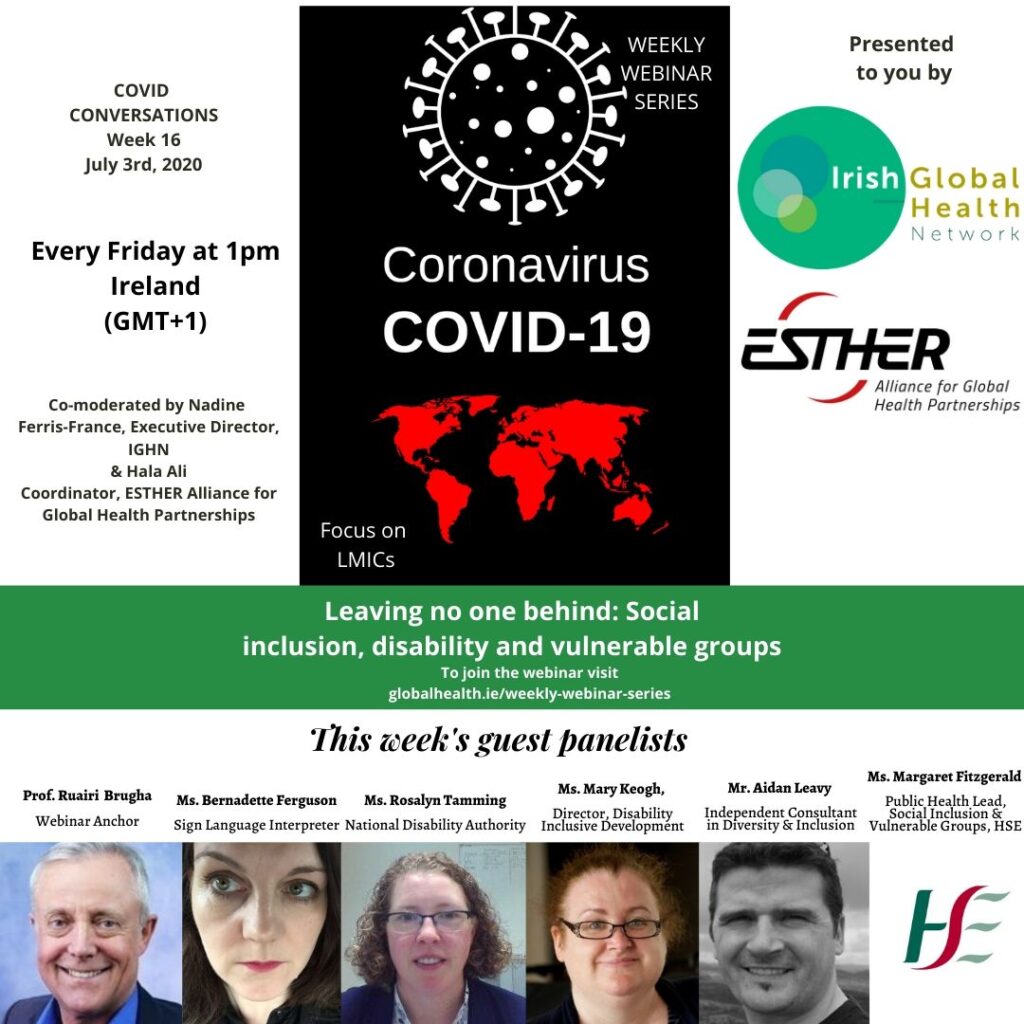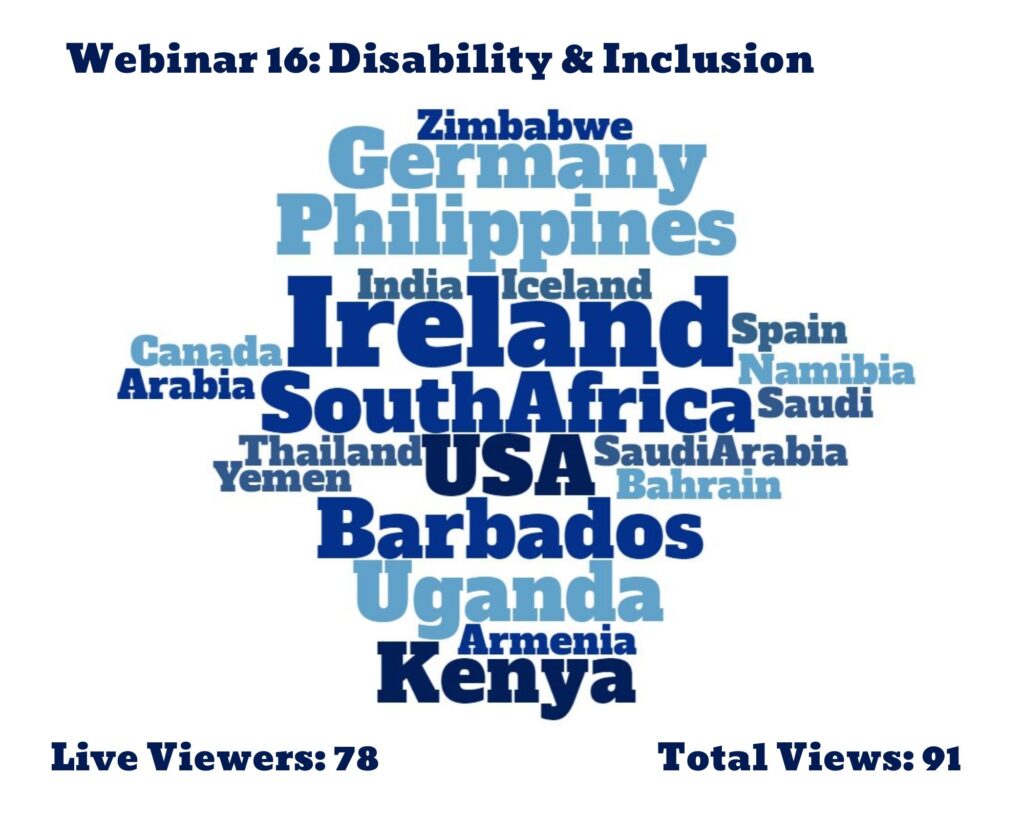Conversations on COVID-19 16th Webinar: Leaving no one behind: Social inclusion, disability & vulnerable groups
 WEBINAR SERIES: WEEK SIXTEEN Leaving no one behind: Social inclusion, disability and vulnerable groups
WEBINAR SERIES: WEEK SIXTEEN Leaving no one behind: Social inclusion, disability and vulnerable groups
The sixteenth webinar was held on Friday 03/07/2020 at 12:00 pm GMT/1PM Irish Time.
This webinar was interpreted live into Irish Sign Language.
The full suite of resources shared by speakers is available under each of their individual recordings, along with a summary of the points they made. A full list of additional resources shared by participants and hosts during the webinar can be found at the bottom of the page.
VIEW THE WEBINARYour feedback is important to us so that we can continue to share learnings, insights and practices relevant to those working in the LMIC community. Please take the time to complete our evaluation at the button below so that we can continue to improve the series.
COMPLETE WEBINAR EVALUATIONA SUMMARY OF POINTS MADE
Ros Tamming, Senior Research Officer, National Disability Authority
The National Disability Authority is an independent statutory body with a duty to provide information and evidence informed advise to the Government. The Dáil have requested research into the affects of COVID-19 for those living with disabilities in Ireland in the past few weeks.
When emergency measures are taken, rapid public health response often fails take into account marginalised groups. Now, we have an opportunity to reflect and ensure that people with disabilities are appropriately considered and consulted for the months ahead. Those living with disabilities are often unnecessarily automatically classed as more vulnerable to disease – non-stigmatizing language is vital. Nursing homes, residential homes for those with disabilities, and residential psychiatric centres have been disproportionately affected by COVID-19. Transitioning to de-institutionalisation and statutory home living schemes as much as possible is recommended.
Education and remote learning has been a serious issue for children with disabilities and their families during COVID-19. Anecdotal evidence from the last few months have indicated that many children with intellectual disabilities had difficulty engaging with remote learning, and this has in many cases led to more difficult behaviours and progress regression. More research is needed in this area in order to create a nuanced future response. Changes to the streetscape to facilitate outdoor activities ie. outdoor dining and coffee shops reduces the path and street space for the visually impaired and those who use mobility vehicles/wheelchairs. Similarly, the transition to online and technology-based medical care and assessments must take into consideration the risk of leaving those with disabilities behind.
To find out more about the National Disability Authority, CLICK HERE
Mary Keogh, Director, Disability Inclusive Development, Christian Blind Mission
There is a universality to experiences of those with disabilities during COVID-19 all over the world. Mary Keogh has been involved with a broad global survey investigating the lived experience of those with disabilities around the world. Barriers to care included difficulties with accessing healthcare and treatments in hospital, transitions to tele-medicine, and lack if easy read formats for COVID-19 related information and press-conferences etc. Access to life-saving medicine was also disrupted for those with disabilities globally.
CBM Ireland has reached out and adapted throughout the COVID-19 pandemic. Ireland’s daily press conferences have become more accessible to those with disabilities, but one of CBM’s focus was how to adapt programmes in countries such as Ethiopia in order to keep patients and staff as safe as possible, with access to food. CBM Ireland engages with local Irish government to make sure that organisations representing those with disabilities were involved in the response at home. The IASC 2019 guidelines (below) put people with disabilities in the centre of discussion around adapting procedures to involve them.
Access to information for those with disabilities is vital during these times, but it is also important to amplify the voices of those with disabilities, to facilitate widespread understanding of their needs and concerns.
For more information on CBM, CLICK HERE
- National Guidelines on Accessible Health and Social Care Services: Introduction etc
- IDA – Accessibility Campaign – COVID19
IASC Guidelines, Inclusion of Persons with Disabilities in Humanitarian Action, 2019
Aidan Leavy, Independent consultant in diversity and inclusion
Many vulnerable groups globally who experience huge barriers to health generally e.g. Young girls & Women, Indigenous populations, LGBTIQ+ people etc. are now at even greater risk as COVID-19 compounds existing issues. Poor and divisive leadership has negatively affected public health efforts all around the world, and that poor leadership can legitimise poor leadership in other countries.
However, positives can be seen also. Use of technology in new and innovative ways have allowed rural and fringe populations to become more connected to the rest of the world, and funding to many groups has been increased. “Artivism” is a new movement that allows artists to share their experiences of the COVID-19 pandemic, and to use their platform to share information. Those living with disabilities being involved in policy adaptation has created greater representation and success, and other initiatives have sprouted in the past few months to bring the SDGs and other health issues to the forefront.
Lockdown procedures creates greater levels of domestic violence and prevents access to SRH services for vulnerable groups. Religious leaders in certain areas have blamed LGBTQI+ people for causing the pandemic. Therefore increased online services and, where possible, in-person psycho-social supports are vital. PLAN are implementing an initiative that focuses on youth outreach through community facilitators in many countries to ensure that young people are aware of their rights and what they can do to protect those rights as much as possible.
- PLAN International Article on LGBTIQ+ Inclusion
- CIVICUS: The Gender and Social Inclusion Toolkit
- COVID and the Human Rights of LGBTI People
Margaret Fitzgerald, National Public Health Lead for Social Inclusion and Vulnerable Groups, National Social Inclusion Office, HSE
COVID-19 has created a constantly moving target for health authorities in Ireland, with the disease causing particular challenges for each vulnerable group. HSE funding allocation and team for Social Inclusion is small and varies throughout the country. Each vulnerable group has their own concerns: the homeless, especially rough sleepers; Roma & Traveller populations; those addicted to alcohol and drugs; those in Direct Provision & undocumented migrants; and victims of human trafficking.
Initial COVID-19 responders had to identify each of these vulnerable groups and mount a public health response. With the help of HSE & MSF officials, a central team to tackle the crisis’ effects on vulnerable people was formed. The initial public health response focused in the main on native-born vulnerable populations ie. the elderly, those with underlying illnesses etc., so this team’s task was to focus attention on other excluded vulnerable groups who may not have the benefits of cars, stable homes, or even the English language.
Continuous communication and co-ordination was essential in the first 6 weeks of the pandemic response, internally in social inclusion and public health services, and also with the public: getting basic COVID-19 health and safety information to those in vulnerable groups was the first priority. Actions included reducing overcrowding, emergency social housing, and reaching out to undocumented populations, Roma, Travellers etc. to make sure they had healthcare support. Early cases and deaths in the Roma populations took the area by surprise, and outbreaks in temporary housing. Translation services for migrant workers and those in Direct Provision was important, and renewed support for community health programmes for these populations must be maintained and expanded in the coming months.
To find out more about HSE Social Inclusion, CLICK HERE
- Roma Populations and COVID-19
- Guidance for Vulnerable Groups
- Rebuilding Ireland- Action Plan for Housing and Homelessness
- Pre-departure Screening for Asylum Seekers and Refugees coming to Ireland
- Infectious Disease Assessment for Migrants 2015
Webinar Anchor: Ruairi Brugha, Professor Emeritus
To view his contribution, click here
Download Ruairi’s Presentation HERE
Ruairi’s Resources
- Worldometer
- Food insecurity will be the sting in the tail of COVID-19
- A UN framework for the immediate socio-economic response to COVID-19
- UN Human Rights – Emergency Measures & COVID-19: Guidance
- ESCAP Policy Brief: Ensuring Disability Rights and Inclusion in the Response to COVID-19
Further Resources:
- COVID-19: Spread solidarity and love, not stigma and fear
- CARITAS Solidarity
- Community Score Cards – a powerful tool to improve public service

CATEGORIES
- Equity in Action Blog
- Training Programmes
- Sponsorship
- Vaccine Equity
- Get Global – Global Health Talks
- Student Outreach Team
- Get Global Young Professionals Talk Global Health
- Global Health Matters – Live Event Series
- Global Health Matters – IGHN Live Event Series
- An initiative of Irish Global Health Network
- ESTHER Ireland and ESTHER Alliance for Global Health Partnerships
- Global Health Matters – Webinar Series
- ESTHER
- IGHN Conferences
- Global Health Conference 2020
- Women in Global Health – Ireland Chapter
- ESTHER Partnerships
- Weekly Webinar Series
- 4th Global Forum on HRH
- Access to Medicines
- Archive Page Weekly COVID Webinars
- Clean Cooking 2019
- Climate Change and Health Conference 2017
- Conference Abstracts
- Conference Materials
- Covid FAQ
- COVID Funding Opportunities
- COVID-19
- COVID-19: Gender Resources
- Dashboard and online resources
- Education
- ESTHER Alliance
- Events
- Events & News
- Funding covid
- Global Health Exchange 2018
- Global Health Exchange 2019
- Global Health symposium 2019
- Health Workforce/HRH
- Homepage Featured
- Homepage recent posts
- IFGH 2011-2012 Conference and Events
- IFGH 2014 Conference
- IFGH Multimedia
- Irish AIDS Day 2017
- Irish News and Feeds
- Key Correspondent Articles
- Key Correspondent News
- Maternal Health
- Multimedia
- News
- News & Events
- Newsletter
- Opportunity
- Our LMIC's Resources for COVID19
- Partner Country News and Feeds
- Past Events
- Policy
- Presentations
- Recurring events
- Reports & Publications
- Research
- Resources
- Student Outreach Group
- Students Corner
- TEDTalks
- TRAINING COURSES FOR HEALTH CARE PROFESSIONALS
- Uncategorized
- Upcoming Events
RECENT POSTS

Imagine a world without nurses

Making Therapy Accessible: Reimagining Mental Health Through Traditional Healing and Language by Talha AlAli

Decolonisation as a framework for Youth Partnership in Global Health by Arwa Hany Sharaby

“Fight the bullies!”

SOT Pre-Conference Event 2025

